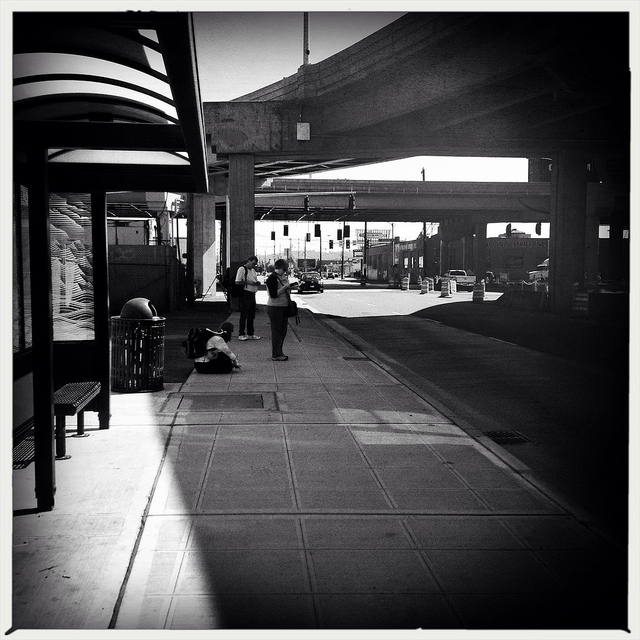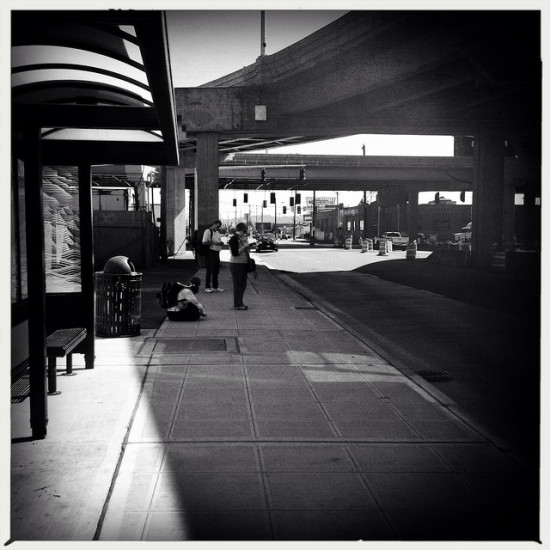Earlier this year, the US House of Representatives—a body that has shut down the government over health care reform, taken a hatchet to food stamps, opposed regulating greenhouse gases, and held immigration legislation hostage—still managed to support a federal transportation bill that devoted roughly 20 percent of its funding to transit + bikes + walking and 80 percent to roads.
How much worse could the road-heavy transportation package being floated by the Republican-led Senate Majority Coalition Caucus in a state like Washington possibly be? The $12.3 billion package that surfaced this week would spend less than 2 percent of that on transit and improvements for cyclists and pedestrians.
It would increase gas taxes in the state by a whopping 11.5 cents, mostly to fund dozens of highway projects at a time when traffic projections around the state are holding steady or dropping. It would spend nearly $9 billion on building roads and throw in $1 billion to maintain them. By contrast, it would devote $42 million to bicycling and pedestrian projects, $37 million to safe routes to schools, $12 million on making streets work better for everyone and about $114 million on transit projects and grants.
It is such a terrible and ridiculously lopsided proposal that a negotiation using it as one of its bookends, which is underway in Olympia right now with the goal of reaching a “deal” by next week, seems highly unlikely to achieve any reasonable balance or progress in creating a 21st century transportation system. That is why we should simply say: No, thanks. We don’t really need this.
King County can go it alone
The Senate Majority Coalition Caucus (which could cease to exist after elections are held in November of next year) apparently thinks it has the Puget Sound region—and anyone who cares about making streets safer for kids, reducing pollution, and giving people convenient alternatives to sitting in traffic—over a barrel. In order to convince us to swallow retrograde highway expansions, they have included in the package long sought-after proposals allowing King and Snohomish counties to ask voters to save the region from crippling transit cuts.
For instance, the proposal would allow King County to ask voters for a 1.5% motor vehicle excise tax to fund transit operations and road maintenance. It’s the best and most egalitarian option to fill a $75 million annual shortfall at King County Metro caused by a recessionary drop in sales tax revenue and provide a more stable funding source. (On top of that longstanding structural problem, state funding for extra bus service from West Seattle during viaduct construction will run out next June.)
But it’s not the only option. King County has wisely come up with a Plan B, which is starting to look more like a Plan A, to raise that revenue without having to go through the legislature. It could form a Transportation Benefit District and ask voters in all or some portion of the county to approve a 0.2% sales tax increase and a flat vehicle license fee of up to $100.
Incidentally, King County Metro has just given us a sneak peak of what will happen if it can’t raise additional funds. It is, quite frankly, a horrorshow. More than 80 percent of bus routes will either disappear, change to provide crummier service levels, or become more crowded. (In my unscientific survey, one of the three bus routes on my commute will be rerouted through neighborhoods, rendering it so slow that I would never be able to make it to work or my daughter’s after school care on time. The second will become an express-only bus, and the third will likely become so crowded in the mornings that people waiting at Aurora Ave. bus stops will get passed by more often than we are now.)
The number of weekday buses on parts of I-405 headed towards Microsoft will drop by 23 percent. The number of buses headed south to SeaTac Airport on 99 will drop by up to 31 percent. People trying to get from east King County to Bellevue on I-90 will lose 15 percent of weekday bus trips. If people no longer have workable or convenient transit options, many of those who can will get back in their cars. And then people will start to realize what bad traffic really looks like.
The MVET option is the most progressive way to raise Metro revenue, since people who can afford to drive spendy new cars would pay more than people nursing beaters, and the revenue stream would also grow with inflation. Sales tax and flat vehicle license fees are unfairly regressive, and they burden the people in our society who can least afford it. But so does an 11.5-cent gas tax increase that forces low-income drivers to pay for massive highway expansions they don’t want and may never use.
From Plan B to Plan A
So while King County would prefer to use the MVET, as long as that option remains embedded in a larger, controversial transportation package, it may not be a workable revenue source anyway.
Metro’s financial picture starts to get really dire towards the middle of 2014, which is why the county is launching a public process now to discuss service cuts. To avoid or minimize those, the agency ideally needs to start collecting new revenue next year.
But if the state legislature decides to put a transportation package to an up or down vote of state residents, or someone tries to repeal it by referendum, that vote could occur as late as November of 2014. If state voters reject the larger transportation package (perhaps on the basis that it’s a terrible roads package or that people don’t want to pay for it), the county’s revenue source would go down with it. And even if it did pass, King County would then have to separately ask county voters to approve the MVET. By that point, Metro would already be well into cutting routes, losing customers, and possibly inflicting irreparable damage.
There is a simple fix to spare the state’s most populous and prosperous counties from the consequences of deep and economically unsustainable transit cuts. The legislature could simply uncouple a bill that gives counties local options for raising transit revenue from the larger statewide package, and pass it with an emergency clause allowing it to go into immediate effect. Naturally, the Senate Majority Coalition is unwilling to agree to this and lose one of its main bargaining chips.
Absent that, it makes more sense for King County to take its chances with just one vote—the one that could occur as early as next April and that asks local pedestrians, cyclists, transit riders, and drivers whether they are willing to stand by and let our transit service fall into an almost unimaginable state of chaos and disrepair.
Raising revenue for King County Metro through a sales tax increase and vehicle license fee isn’t the ideal scenario. And because cities can also form Transportation Benefit Districts and the state caps the vehicle fee that any single person would pay at $100, a countywide TBD would make it necessary for cities and the county to share.
But Plan B looks a whole lot better than hitching the fate of King County’s transit system to an irresponsible roads package that’s likely to crumble under voter objections anyway.










John Niles
Most of the transit ridership in State of Washington is aboard buses. That will be true in the future around this region as well, according to the long range plan of PSRC that forecasts bus ridership in 2040 to be four times rail ridership, even with the third phase of light rail funded, built, and in operation.
Has Jennifer Langston examined the proposed WSDOT project list to see what amount of the spending goes to building or rebuilding roads on which buses ride? Does that use of roads matter to Sightline?
What about roads for Safeway trucks delivering groceries in the middle of the night? Or family farmers delivering local fresh food to Pike Place Market and Whole Foods? Or trucks picking up trash, delivering construction materials to building sites, or ambulances taking people to hospitals? Aren’t roads important for that?
Also, isn’t a proposed 11.5 cent bump in the gas tax a pretty good carbon tax, since a lot of the carbon generated in this state comes from the tailpipes of cars?
Steve Erickson
As a Carbon tax intended to reduce emissions, a gas tax hike is only effective if a lower Carbon alternative is available for people to switch to. The Senate so-called majority package fails this test.